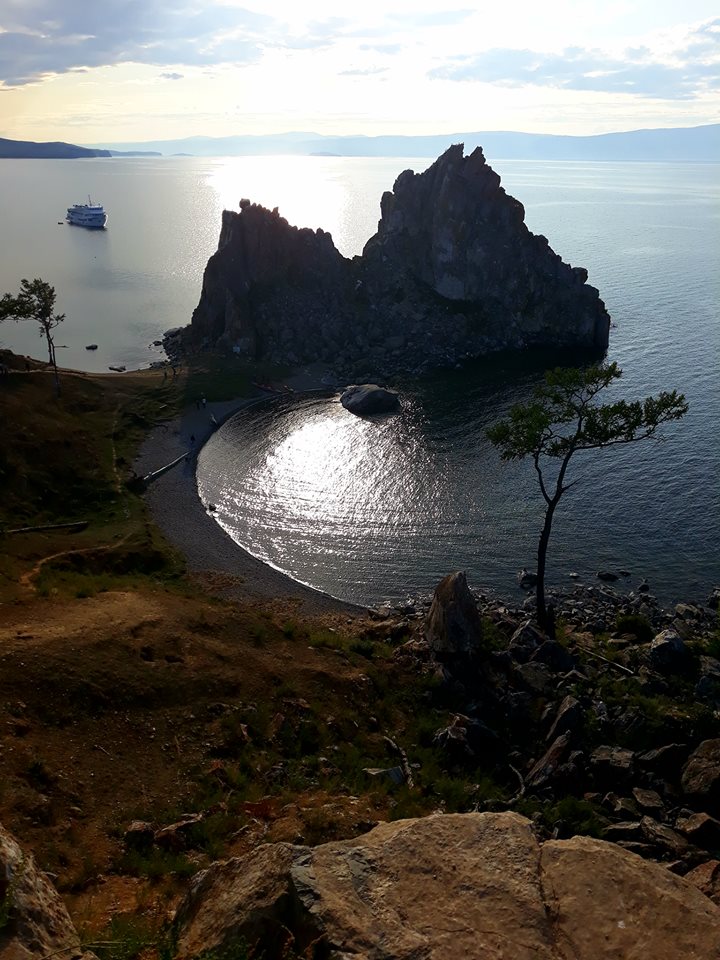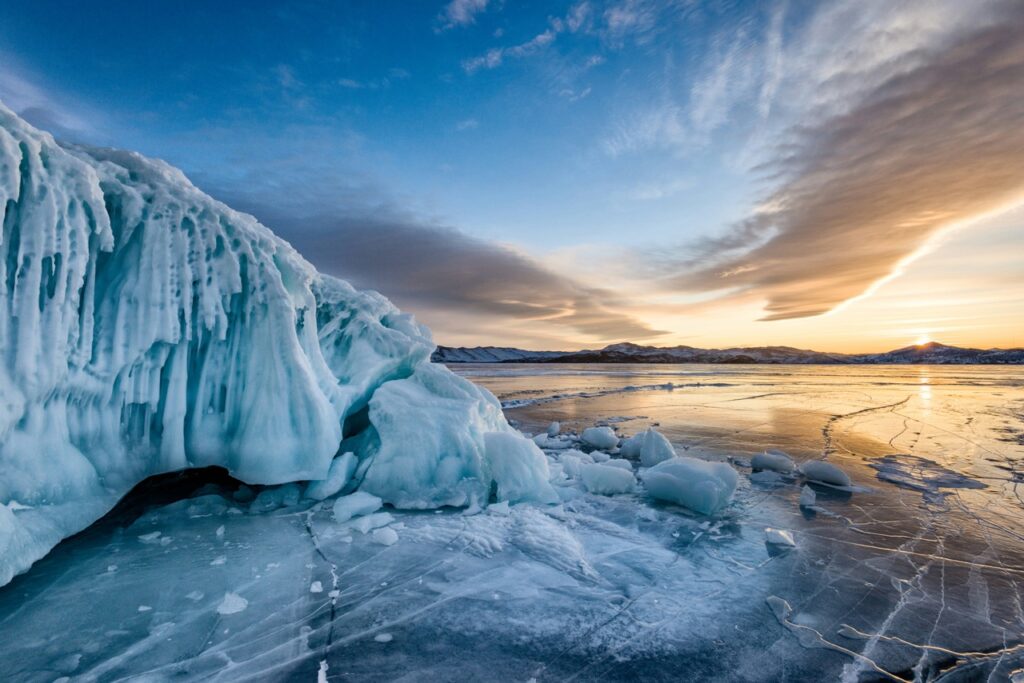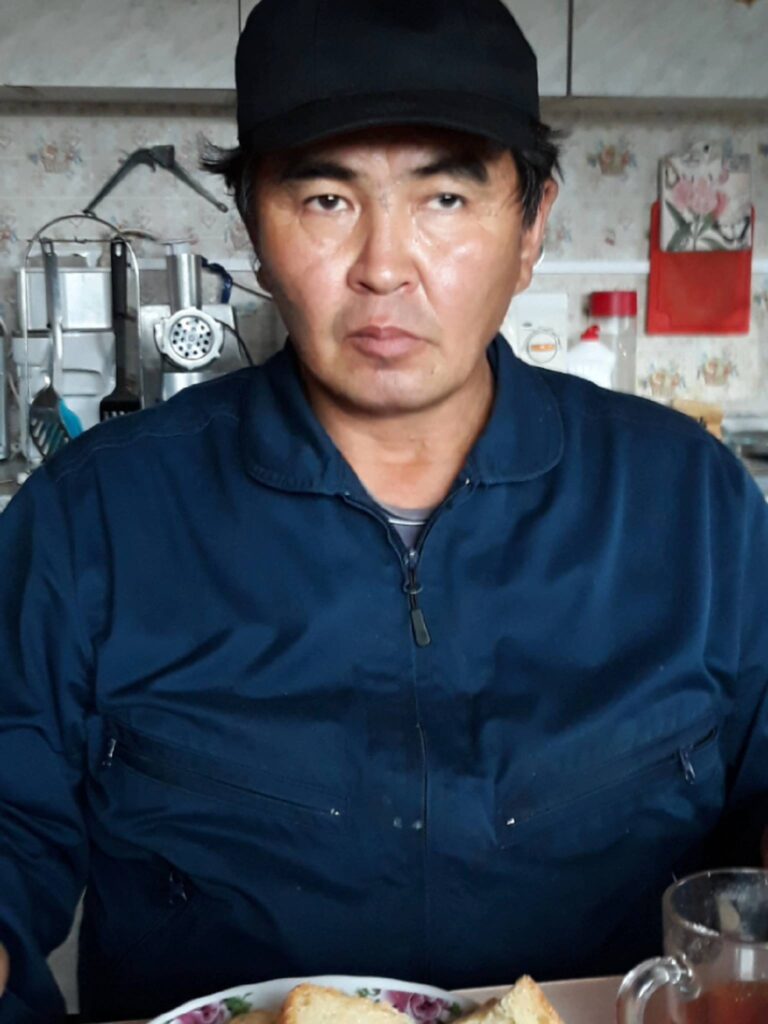In 2019, I went to Russia. I had heard about a lake that was the deepest in the world and had special shamanic significance. You had to get the Trans-Siberian Express to get there. Somehow, I can’t remember how, I found out about a shaman, who lived near the lake.


I wanted an otherworldly encounter because real life is so limiting. I don’t want to have feelings and hear about other people’s feelings. Feelings are too difficult; too uncomfortable when you’re overwhelmed with sadness and grief. I want to transcend my human self. Since I stopped drinking, I have dived into music and poetry rather than vodka and valium. I need to know there’s something else before I die. If this is it, I can’t bear it. So I have to find something bigger than humankind.
I can’t do organised religion. I want to recreate the druidic experiences of my Celtic ancestors. Shamanism in Siberia is going strong, and the vastness of the place and its resonance through history lured me there. But there was an undercurrent in my encounter with Valentin Khagdayev that I cannot put into words. It was as though, cloaked in ceremonial robes, intoning shamanic spells and, later, in his normal workaday clothes, sitting at his kitchen table, lecturing me on western sanctions and Russian fortitude, there was no sign of who he was, just how heavily he was weighed down. A heart-breaking loss, the burden of unexpressed grief and how it bends people, how it shapes a society and strips an individual of his or her dreams – perhaps this was what I saw in Valentin Khagdayev. He was just as sad as myself.

A shaman is a middle man, a Mr Fix-It. In other words, he is an ecstatic, a soul-projector, a spirit-master. Valentin had a lot to live up to. To his neighbours, Valentin is the tourists’ shaman. Even his cousin, my driver, shook his head when I said I was going to see him.
“The real shamans only see their own people”, he said. I was disappointed when he refused to take me to the ‘real’ ones. I saw myself watching the kind of show tourist agencies put on for coach groups, full of bells and whistles and hoohah.
I had come all the way to Siberia and I was not going to leave till I had dug deep into the earth of this vast, terrifying land. I had to see Valentin because I wanted to see inside the mystery of a continent that since I was a child has been considered The Enemy – an enemy I had always felt drawn to, because, as a child, I felt essentially unwanted, and I couldn’t work out why. Or perhaps I didn’t dare, because if I did, it meant I was unlovable.
Everything about Russia, even its alphabet, spells mystification. I wanted to see the land that Gogol talks about when he describes his fellow writer Pushkin saying, “Goodness, how sad is our Russia!”, and yet “…what is this inscrutable, mysterious force that draws me to you?” I wanted to see if Valentin Khagdayev could explain what this force was that I myself felt emanating from the waters of Lake Baikal.
As I looked into the saddest eyes I have seen, I think Valentin understood this. Three years into the war with Ukraine, I have not forgotten him. When I heard news of his colleague, a shaman from eastern Siberia, who was forcibly hospitalised for offering to cleanse Putin of his demons and, more controversially, to cleanse Russia of Putin, I thought of Valentin.
In a post-secular world, Russia’s President Putin takes religion very seriously. If you happen to be Russian Orthodox, this is good news. The Patriarchate’s embrace of Russia is so encompassing that it represents the geo-political struggle of Orthodox Russia versus the Spiritless West. In 2012 the church wrapped its grip round the courtroom with the trial of the courageous, marvellous Pussy Riot collective and other “blasphemy” trials against artists. This was in Moscow, Putin’s showcase.
There is an old Russian saying which roughly translates as, “The further you are from Moscow, the closer you are to God.” I was more interested in what was happening in some of the more obscure departments of Russia where I hoped the grip would be looser. Across the formidable expanse of Siberia, where the continent of Europe becomes Asia, Siberian shamanism was enjoying a resurgence.
I got off the train just before it reached Mongolia, at Irkutsk, the soi-disant Paris of Siberia. This was the south-eastern part of the Siberian Federal District, and the ancestral land of the Mongols and the khans. Hilly country surrounds the city. Herds of horses and cattle feed on the broad pastures that spread out from the hills.
I was greeted by my first driver: Anatoly, a direct descendant of one of the Cossacks who came to this region in 1661. He was small and dark and inscrutable. He wouldn’t look me in the eye, or answer my questions. I wondered if he had some secret sorrow, or a toothache. I didn’t know if unfriendliness was a Cossack characteristic. But in harsh conditions, friendliness was not something I could expect. Despite my feelings of alienation, as a Westerner I had no idea of what hardship felt like.
I knew some basic facts about the history of the Cossacks. They founded Irkutsk Oblast (district) as a satellite state of Tsarist Russia. Like all invading forces, they were rapacious and brutal. Before the Cossacks drove them out, this land belonged to the Buryats, who are close cousins to their neighbours in Mongolia. The Buryat Republic lies on the other side of Lake Baikal, but it’s still part of Russia. The Buryats are now being deliberately conflated with North Koreans who have joined Russia’s troops in Ukraine. Their exploitation and oppression is never-ending. What makes this all the sadder, is their obscurity. So no one gets to hear their story, and this became something of a driving motive for me to write about my encounter with Valentin.
The closer we got to Lake Baikal the more Asian features I saw in the faces around me. Round, brown, shrivelled walnuts were the faces I saw. Mostly elderly men and women, sitting outside shops that sold liquor. Two old men stood out in particular. They were both leaning in the direction of the east, like blasted trees.
Baikal, the oldest lake in the world, as well as the deepest, is sacred to shamans; for them, it is the holiest place in the northern hemisphere. There were still signs of Buryat shamanism along the empty highway. The cult of obo, holy places of power, were the most visible sign. At each obo, a totem pole, Anatoly paid tribute to the local spirit guide. He got out of the car and placed a cigarette at the bottom of the shrine. He advised me to sprinkle mineral water in the four cardinal directions. It should have been milk or vodka, but never mind. We then took advantage of the narodnidom, or “people’s house”, that stands beside each obo. In the old days travellers could find a room, stables and a samovar. Now we entered breezeblock cafés with formica tables and unsmiling proprietors who serve up borscht and pelmeni. Packs of dogs whine for scraps of meat or affection. No one smiles here.
The campaign against smiling started in the early Soviet era. Old agitprop posters show US capitalists wearing cylinder hats, smoking cigars and smiling, as they relish their piles of money and their power over the exploited classes. The image of an insincere smile was used to depict US politicians, “warmongers” from the military-industrial complex. But it also applied to normal Americans, who, Soviets were told, used smiles to betray one another in business and personal relations. A smile also indicated an egotistical expression of individuality inappropriate to a collective community.
During the Soviet era, which was approximately seventy years, the Buryats, like other Soviet citizens, had to believe in the USSR, They learnt to speak only in Russian and memorise the “Moral Code of the Builder of Communism”. Many forgot their own language, not to mention their religion.
No one has told them that it’s okay to smile again. Or maybe they have forgotten how.
The further I got from Irkutsk the flatter the land became; it was exposed to winds from all directions, so that every breeze was a sign of incoming weather. Some distance from the highway, the land was an empty space that filled me with awe. Underfoot there was spongy thistle and aromatic herbs, and to my mind this immense, treeless steppe was as enchanting as the pine forests I had watched from my cabin window on the train.
At Lake Baikal the sun was high and the sky was blue and the water was cool and transparent. It was once the purest on the planet. Local legend has it that swimming in Baikal gives you an extra five years of life. Its water, filtering down from the surrounding mountains in one hundred and eighty-three streams, is so clear and fresh it is like drinking Evian. In terms of surface area, the lake is as big as Belgium; its volume is equivalent to all five of the North American Great Lakes. And just as the cliffs rise up several hundred fathoms from the edge of the lake so do they go down to its bed. Given its unfathomable depths, it is the largest body of water in the world, and, in a million years or so, will have become a sea. Another legend has it, and local newspapers report it to this day, that visions suddenly appear out of nowhere: villages hang over the lake in summer, trains roll silently across the ice in winter, and castles and ships float on the horizon.
Once we got into the thick of it, I had a new driver, Leonid, cousin to Valentin the shaman. He is in the 16th generation of his family to live on Lake Baikal.
“All Mongols and Buryats are descended from the same two hundred and seventy-two men”, he said, and those men were Chingis Khan’s sons.
The ruts in the land we crossed were several feet deep. The 4×4 UAZ 469 Leonid drove was a real vintage piece, originally built in 1971 for the army. Stones smashed against the truck’s belly as we jolted from side to side. We were coming to the part of landscape around the lake that is semi-desert. The road to the tract was constantly dissolving, and at times it would have been impassable if it hadn’t been for Leonid’s iron-fisted grip on the steering-wheel. This went on for hours. In a forest clearing we stopped to pick berries. Through Alina, my interpreter, I asked Leonid about his life. He said he had spent his youth in one of the labour camps that once surrounded the lake.
What was that like, I asked naively.
“Fishing in all weathers and processing it with my bare hands standing up to the waist in water; spending the night in the barracks, wet through and with very little food. The prisoners had it worse. In the winter, they stood for several hours at a time in frozen water holding the nets; they caught the omul under the ice, and ate it raw.”
The steeliness of this man was unbreakable.
“When a stormy wind blew”, Alina said, echoing Leonid’s words, “the Sarma – we rejoiced.”
She explained Leonid’s meaning. “The Sarma is the coldest wind on the lake. It blows at fortyl meters per second.”
I was speechless in the face of such extremity.
“Yes. Leonid and his colleagues rejoiced on those days because they were days off.”
It sounds brutal, I said.
He preferred it to being a tourist guide, she replied.
Why?
She turned to him, and repeated my question.
“I didn’t have to talk to anyone”, he said.
With the subject of tourism, Leonid’s tone became harsh. He was angry that tourists come to Baikal – this cosmology of animal spirits and dead souls, where a species of shrimp eats all organic matter and keeps the lake’s water clean. Tourists like me come and they climb over its sacred places, where the gods meet once a year on marble rocks jagged as fangs and where the Lord of the Lake lives in a cave festooned with red lichen. They come here to take selfies and deface obos with their litter.
“They leave ribbons on poles and have no idea what they are doing. They don’t understand our traditions. When they go, when the season ends, we remove their ribbons and burn them. We keep our sacred places hidden.”
More than anything, more than irritation with naive tourists and uncaring authorities and contempt for the hotels that dump their waste into the lake, Leonid grieved for Nature. Leonid loved this land, and I found myself jealous of his place in it.
To be continued./
